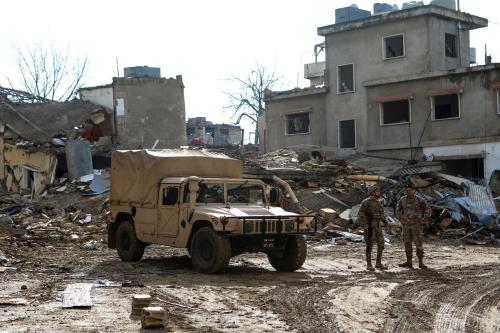Editor’s note: On December 12, Kenneth Pollack delivered testimony on the resurgence of al Qaeda in Iraq before the joint hearing of the Terrorism, Nonproliferation, and Trade Subcommittee and the Middle East and North Africa Subcommittee of the House Committee on Foreign Affairs.
Read an excerpt below, download the testimony and watch the testimony online.
Mr. Chairman and distinguished Representatives, I am honored to be able to appear before you to discuss the situation in Iraq and the resurrection of al Qaeda since the departure of U.S. forces in December 2011. It is a great credit to this committee that at a time when the nation appears determined to forget our interests in Iraq, you refuse to do so. It is absolutely vital. Since 2003, the United States has invested an enormous amount in Iraq, and the future of Iraq remains of great importance to the interests of the United States and our allies. Iraq has replaced Iran as the second leading oil exporter in OPEC, and projections of future low oil prices are highly contingent upon the continued growth of Iraqi oil exports. Remembering that virtually every postwar American recession was preceded by an increase in oil prices, Iraq and its oil production remain critical to the prosperity of the United States.
Unfortunately, over the past two years, Iraq has taken a noticeable turn for the worse, although how bad things will get still remains uncertain. Our topic today, the reemergence of al Qaeda in Iraq (AQI), is among the most visible and frightening manifestations of Iraq’s downward turn. AQI has been one of the principal culprits in the worsening violence across Iraq. In 2012, Iraq experienced a 10 percent increase in violent civilian deaths. That was the first annual increase since 2006, prior to the so-called “Surge.” In 2013, Iraq may very well experience a 100 percent increase in violent civilian deaths over 2012. Thus, it is not an exaggeration to say that violence is multiplying in Iraq by orders of magnitude.
However, we need to recognize that the increasing violence in Iraq, and the reemergence of groups like AQI do not constitute Iraq’s problems per se. They are instead the symptoms of those problems. They are the outward manifestations of deep-seated structural conflicts and unresolved differences among Iraq’s various constituencies. Although it is not impossible to mitigate or even resolve those underlying problems, they will not be overcome easily, and few of Iraq’s political leaders are making the kind of effort that would be needed to do so. Instead, most of Iraq’s leaders concentrate on achieving short-term tactical gains against their rivals, often in ways that exacerbate those problems rather than ameliorating them.
The Brookings Institution is committed to quality, independence, and impact.
We are supported by a diverse array of funders. In line with our values and policies, each Brookings publication represents the sole views of its author(s).



Commentary
TestimonyThe Resurgence of al Qaeda in Iraq
December 12, 2013